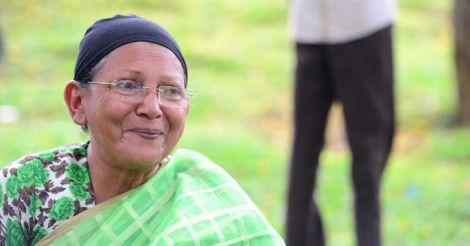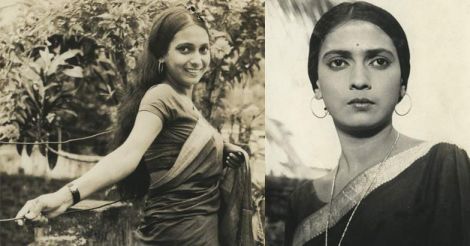Jameela Malik was no accidental actor. As an instinctive child artiste, she enthralled royals and revellers alike. From a movie-crazed girl who belted out filmy dialogues in family circles to the FTII’s first woman student from Kerala, she recounts the unlikely life of a young woman in the 1960s and 70s.
(Jameela Malik as told to Sulfiquar)
Father’s death came like a wind that blows the candle. I was six years old. All of us were small. My mother overcame that void with her writing. It was not easy for a woman to publish a weekly all by herself in those days.
Kambisseri (Karunakaran) uncle stood by us. Vaikom Muhammed Basheer used to write to us. He would also sent us books. He wanted to know if the children read the books he had sent. Mother would read out those funny letters to us.
We raced to read Basheer’s books. We took pleasure in acting out the characters in front of the mirror. My aunt would tease me whenever she saw this.
Even she was a good storyteller. Whenever my maternal grandmother visited us, they formed a team. My grandmother would tell us Christian tales, while my aunt dished out Arab stories. That is how I became fascinated by stories.
Read Part 1 : Jameela Malik: Born into freedom struggle
My aunt never missed a namaz. She also took care to arrange a place for my visiting grandmother to pray. They were a terrific team. I can’t help remember them whenever I see people fighting each other and turning their back on each other. Those memories bring tears to my eyes.
My mother never waited for anyone’s help in any crisis situation. My father was adamant that we should not accept anything from my mother’s family. He had paid an advance amount for a press. Mother bought it and renamed it as Malik Memorial Press.
After the death of my father, the Congress fielded my mother as a party candidate in the local election. She won to become the first woman in the Kollam municipal council. She was an active member of the party even when R Shankar and C M Stephen planned a women’s wing.
She was sentenced to two months imprisonment in a case related to the liberation struggle. By that time, she had lost the press. She had spent her earnings of a lifetime on it. She gradually drifted away from the Congress but stayed active in social life.
 Jameela Malik was no accidental actor.
Jameela Malik was no accidental actor. She contested to the municipal council again from the Cantonment seat, this time with the support of the Revolutionary Socialist Party. She was invited to the party by T K Divakaran, my father’s friend. He was a humane leader.
Tryst with arts
I joined the school drama team picked for the district youth festival. Our play was titled ‘Oru Muri Thenga’ (Half a Coconut). It dealt with two women fighting over half a coconut. My teachers and friends thought I did a wonderful job. I became a star in the school with a single play, which one the second prize at the event.
I had a celebrity visitor at school when ‘Chemmeen’ was in the planning stage. They were looking for a girl to play the role of Karuthamma’s little sister.
One afternoon, a white Ambassador car stopped by the school. Prem Nazir got down from the car, to the hysteric cries of the students. He walked into the office room and introduced himself to the stunted teachers.
He was, in fact, Prem Nawaz, the brother of Prem Nazir. “I want to meet Thankamma Malik’s daughter, Jameela Malik,” he said.
I was trembling with excitement when I faced him. I had never seen a movie actor before. He asked me something and I replied. I do not remember what we spoke.
He patted me on the cheek and drove away in the car. The children chased the car. I was not offered a role in ‘Chemmeen’ though. The role went to Latha P Nair’s daughter.
I had another reason to be smitten with movies. As the councillor’s children we didn't have to pay to watch movies. My younger brother insisted on watching a movie on its release day. He would drag me to the Ratna Theatre in Kollam. A few of the employees at the ticket counter did not like us. They chided us for being there on the release date. We could not care less. Yet some others liked us. They ensured that we got better seats and even bought us tea.
All those movies were not for nothing. We would stage the stories back at home along with the other children from the neighbourhood. We had a cot as big as a stage. That belonged to my grandfather. We would carry it to the courtyard and perform on it.
One popular novel at that time was ‘Soudamini’. I wrote dialogues based on the story and taught them to the other children. Our little play was a hit in the family.
Royal recognition
My mother found it extremely difficult to run the weekly. She dropped it eventually. We left Jonakappuram and shifted to Thiruvananthapuram, where mother found job as the principal of the Hindi Prachara Sabha. We kept moving from one rented house to another, and ended up losing the precious letters from Mahatma Gandhi and Vaikom Mohd Basheer in the process.
There were pleasant surprises too. Actor Madhu wanted to present a play on the occasion of the Travancore king’s birthday in the palace. He was the lead actor too. The play was named ‘Trishna’.
Madhu was at the peak of his career. ‘Chemmeen’ was running to full houses. He was looking for someone to act the part of a mentally retarded 14-year-old girl. I was chosen.
The moment curtains came down on the play, the audience rose in applause. The king himself got on the stage to congratulate each member of the troupe. He held me close. I was the youngest of the crew. It was the first recognition that came my way. My eyes welled up and my voice cracked. I spotted my mother among the audience. I could not tell if she was smiling or crying.
Movie publications including ‘Cinerama’ published my photo along with Madhu. I was a celebrity of sorts in school and the neighbourhood. ‘Cinerama’ was edited by Kambisseri uncle. My mother used to write a column for the magazine.
Interestingly, I got another opportunity to work with the same team. The troupe was about to present a play for the Thrissur Pooram but its lead actress had other commitments. Thikkurisi, who was our family friend, mentioned my name to Madhu.
I was taught the dialogues on the way to Thrissur, as if I were preparing for an exam. The play was titled ‘Lubdhan Lukose’, an adaptation of an English play. (Years later, the Doordarshan telecast the play as ‘Pishukkante Kalyanam’ and I was offered the same role.) The play was a hit among the crowd even though we had little time to rehearse. Thus I started my career opposite Madhu sir.
The movie craze had taken its toll on my studies. I flunked a couple of exams. I excelled in NCC though. I was chosen the best cadet in camps held in Delhi and Munnar. My experience in acting and dancing helped me a lot in those camps.
Kambisseri uncle knew that I had a passion for acting as my mother had told him. He told my mother that she must send me to a film school.
(To be continued...)

























 From a movie-crazed girl who belted out filmy dialogues in family circles to the FTII’s first woman student from Kerala, Jameela recounts the unlikely life of a young woman in the 1960s and 70s.
From a movie-crazed girl who belted out filmy dialogues in family circles to the FTII’s first woman student from Kerala, Jameela recounts the unlikely life of a young woman in the 1960s and 70s.